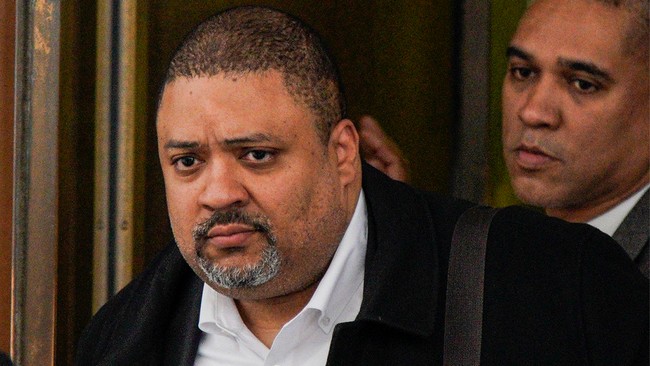
Chicka-chickaaaah. If you know, you know.
Everyone seems to realize that the days of lawfare are over — at least for Democrats. Jack Smith has decided to get out of Dodge, er, Washington DC, before the new sheriff rides into town on January 20. The Georgia Court of Appeals suddenly canceled a hearing without explanation, which could mean that Fani Willis has decided enough is enough.
That leaves Alvin Bragg, whose conviction on an absurd alchemy of an indictment that turned ledger entries on an NDA payment into 34 felonies against Donald Trump remains in limbo. Rather than read the room or the verdict from the 2024 presidential election, Bragg remains determined to keep his case on life support for the next four years. Rather than admit defeat, Bragg’s office appeared in court this week to tell Judge Juan Merchan to freeze the case until Trump leaves office, lest a veritable pandemic of questionable ledger entries suddenly erupts across the globe.
This risible position turns out to be too much even for New York Magazine. Elie Honig pours scorn over the idea of keeping the Braggenstein Lawfare Monster alive, and tells his former colleague to get a grip:
The hush-money case against Donald Trump is moving inexorably towards its final resting place — back on the same scrap heap it came from. But the DA’s office isn’t quite ready to give up just yet. In a court filing this week, prosecutors conceded that Trump’s sentencing should be postponed while the parties litigate whether he has constitutional immunity, along with other novel issues arising from his status as president-elect. That part is entirely reasonable.
But the marvel is that prosecutors somehow managed to type the following sentence without using Comic Sans font: “Consideration must be given to various non-dismissal options that may address any concerns raised by the pendency of a posttrial criminal proceeding during the presidency, such as deferral of all remaining criminal proceedings until after the end of Defendant’s upcoming presidential term.” In other words, the DA argues, we might still want to sentence this guy after he’s done with his second term as president. In 2029.
I know what you’re thinking: New York Magazine? You mean New York MAGA-zine, amiright? Well, not quite. Elie Honig has spent quite a bit of time in his perch as CNN legal analyst attempting to dissect Bragg’s bizarre legal theories, and has generally acted as one of the few center-Left voices of reason. The commenter at NY Mag don’t particularly appreciate this insight, but they aren’t rabid about their criticism. One accuses Honig of choosing “technicalities in defense of the indefensible over justice.”
Of course, technicalities matter in law, which the Illinois Supreme Court rightly emphasized yesterday in dismissing Jussie Smollett’s hate-crime hoax conviction. But Bragg’s case is built by stacking technicalities on technicalities in a way that abuses the law for political retribution, not justice, a point Honig emphasizes:
The problems with the hush-money case were numerous. It had been rejected by the Feds at the Southern District of New York (Bragg’s old office, and mine) and even the Federal Election Commission as a regulatory matter. Bragg’s predecessor as Manhattan DA could’ve charged the case but didn’t and later referred to star witness Michael Cohen as “more than a problematic witness.” The legal theory here was, shall we say, inventive. The DA took one expired state-level misdemeanor, stacked another expired state misdemeanor on top of it, then piled a federal campaign-finance violation on top of that, and presto: an electroshocked state-level felony. No other state prosecutor — anywhere, ever — has charged a federal campaign-finance crime in state court, either as a count unto itself or as a predicate underlying offense. There’s good reason for that. Professor Rick Hasen, a liberal expert on election law, said (in a different context, unrelated to the Trump case) that “someone trying to use state legal process to find a criminal violation … for use of [federal] campaign finance money” could be not merely frivolous but “sanctionable,” meaning so outrageous that a court could fine a lawyer who even raised the argument (the very same upon which Bragg’s case depends).
Even the freeze is intended to be vindictive. Thanks to New York law, convictions and most trial decisions cannot be appealed until after sentencing has concluded. That process frustrated Trump’s attempts to challenge decisions in this case as well as in the Letitia James lawsuit that resulted in the $450 million judgment against The Trump Organization, over alleged fraud that didn’t cost anyone a dime. If Judge Merchan goes along with Bragg’s request, Trump won’t be able to appeal the case in any fashion until 2029, when Merchan or some other judge finally issues a sentence and formally enters the conviction into the record (which hasn’t actually occurred yet).
And all of this comes over a non-disclosure agreement payment that was in no way illegal, for alleged behavior that was also in no way illegal. How exactly is this ‘justice’? This is nothing more than a massive in-kind political contribution to the Biden/Harris presidential campaigns, of the very kind that Bragg claims to be fighting in this very prosecution. And not only did it fail, it backfired, as Honig also points out. The indictment was such a shabby piece of political warfare that it instantly vaulted Trump to the top of the polls in the GOP primary. The follow-on prosecutions made Trump an even bigger symbol of defiance to the establishment that tried to bury him with all means at their disposal, and Trump ended up more popular than ever — even in Manhattan, as Honig points out, although that was a low bar to clear.
Alvin Bragg may not realize it yet. Judge Juan Merchan may not realize it yet. But Elie Honig knows it, and so does the rest of the country. It’s over.
If you really didn’t get the joke in the headline, here’s the reference. Life comes at you pretty fast, though. Alvin Bragg just discovered that. Chickaaaaaaaah.




